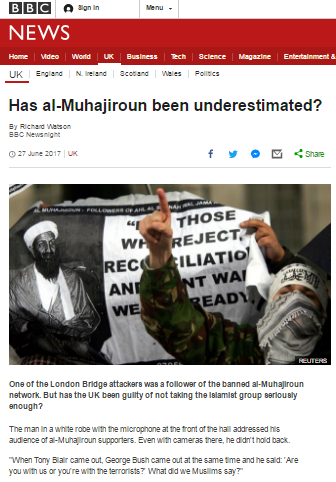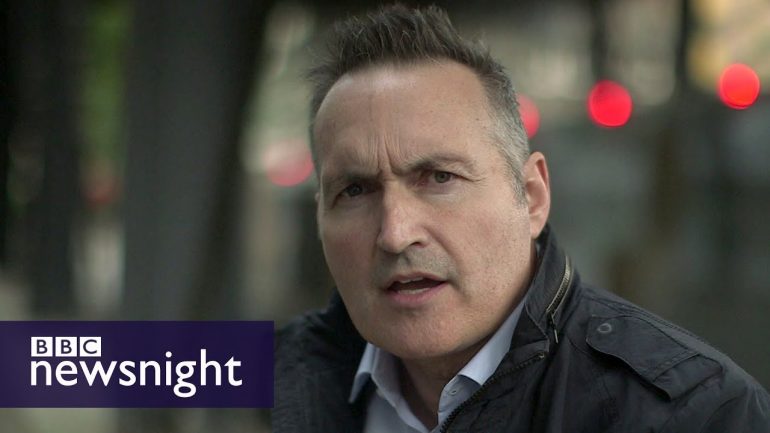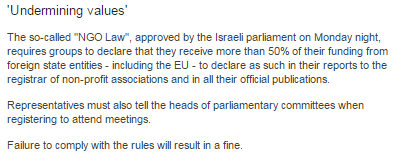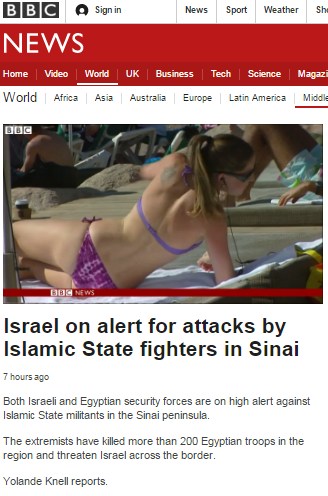On June 26th BBC Two’s flagship news and current affairs programme ‘Newsnight‘ aired a report by Richard Watson.
“Newsnight’s Richard Watson has been following the extremist group al-Muhajiroun for 16 years. In this film, he reveals how the group became a crucible of home-grown terror, from the 7/7 London bombings to the recent London Bridge attacks.”
The following day an article by Watson on the same topic appeared on the BBC News website’s UK page under the title “Has al-Muhajiroun been underestimated?“.
“One of the London Bridge attackers was a follower of the banned al-Muhajiroun network. But has the UK been guilty of not taking the Islamist group seriously enough?”
That question crops up repeatedly in both the written and filmed reports. [emphasis added]
“In the late 1990s, Bakri Muhammad toured towns and cities with large Muslim populations in a recruitment drive for his new group. He was largely unchallenged by the British state, which had been preoccupied by the threat posed by Irish republican groups.
They dismissed Bakri Muhammad as a fool. In the wider community, few realised how divisive and dangerous his views were.”
“Fast-forward to 2017 and the terror attack at London Bridge had a strong link with al-Muhajiroun. The attack leader Khuram Butt was a supporter of the network, even appearing in a Channel 4 documentary last year called The Jihadis Next Door.
Butt didn’t exactly hide his extremist sympathies, and this raises a huge question for the British state – was the threat posed by radicals linked to al-Muhajiroun underestimated for years?“
“”We’ve been far too tolerant of al-Muhajiroun,” says [Col. Richard] Kemp. Their use of abusive language and threats was not tackled, he suggests.
“It was a major failure and we’ve seen the consequences – we’ve seen Lee Rigby [murdered] by a follower of al-Muhajiroun, we’ve seen numerous attacks around the world.”
“By 2004, it was clear that the al-Muhajiroun network had been at the very least a gateway to terror. […]
So why was more not done? This was ideological extremism and the leaders of the network, like Anjem Choudary, were always careful to stay, just, on the right side of the law so they could not be arrested.”
Indeed the al-Muhajiroun network’s extremism has been glaringly apparent for many years and there were those who tried to raise the alarm on that issue.
However, one topic completely absent from both Richard Watson’s reports is that of the UK media’s frequent provision of a stage for the man who was for many years the face of that network in its assorted forms – Anjem Choudary – as the Telegraph reported last year:
“The BBC and other broadcasters have come under fire for regularly offering Anjem Choudary a platform to air his controversial views.
Ignoring warnings about offering the firebrand cleric the “oxygen of publicity” Choudary became a regular on many of the corporation’s flagship news programmes including Newsnight and Radio 4’s Today.
During his trial Choudary described how he would “bait” the media with controversial statements and relished appearing on air.
The court heard how he had hundreds of media contacts who he would tip off before high profile demonstrations and stunts, including 31 journalists from the BBC.”
As was noted here three and a half years ago:
“…the BBC has been wheeling out Choudary and his template propaganda for over a decade, including a ‘Hardtalk’ interview from 2003 in which he refused to condemn the Mike’s Place suicide bombers, another ‘Hardtalk’ interview from 2005 in which he likewise refused to condemn the London terror attacks, participation in ‘The Big Questions’ and ‘Newsnight’ and an appearance on ‘Newsnight’ in May 2013 (also promoted on the BBC News website) in which his stance on the brutal murder of Lee Rigby was made amply clear.”
Especially given that ‘Newsnight‘ was one of Choudary’s regular spots, one would have expected to see in Watson’s reports some acknowledgement – and explanation – of the editorial decisions that lay behind over a decade of facilitation of Choudary’s PR efforts, despite recognition of the fact that his various networks were “a gateway to terror”.
Related Articles:
BBC coverage of Choudary conviction ignores his BBC appearances
Anjem Choudary’s BBC appearances ignored in reports on his arrest
BBC interviewee’s group noted in terrorism study
The BBC, ‘democratic principles’ and the Jihadist recruiter





